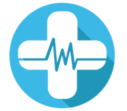Hay fever (allergic rhinitis)
Hay fever (allergic rhinitis) is an allergy caused by pollen or dust which causes the mucous membranes of the nose and eyes to be inflamed.
Inflammation of these membranes causes cold-like symptoms, such as itchy or watery eyes, a runny nose, congestion, sneezing, and sinus pressure.
Your hay fever can get worse at different times of the year. Common hay fever ‘triggers’ are tree pollen (common in early spring) and grass pollen (late spring and summer).
People can also have perennial (year-round) hay fever caused by dust mites and pet dander.
Hay fever is usually worse between March and September, when the pollen count is at its highest, especially when it is humid, warm, and windy.
Hay fever can last for weeks or months at a time and there is currently no cure.
However, with the right treatment from Ahmeys and an awareness of what triggers your symptoms, you can manage your hay fever and live a normal life.
Symptoms
Typical symptoms of hay fever include:
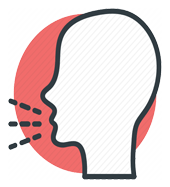
Coughing and sneezing
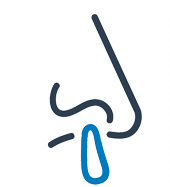
A blocked or runny nose
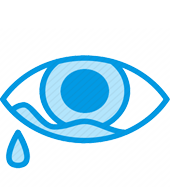
Red, itchy or watery eyes
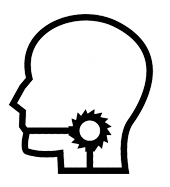
Itchy throat, mouth, ears, and nose
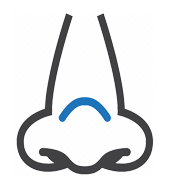
Loss of smell
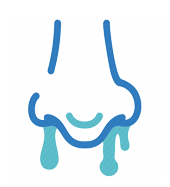
Congestion
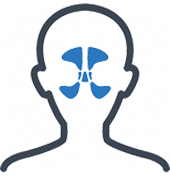
Sinus Pressure
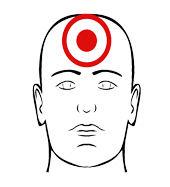
Pain around your temples and forehead

Headache
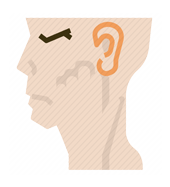
Earache
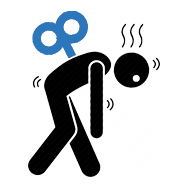
Tiredness
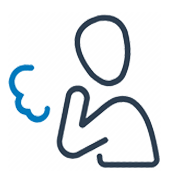
Shortness of breath, wheezing, and or coughing
Complications of hay fever can include:
- Reduced quality of life (hay fever can make you less productive, lead to absences from school or work and interfere with your enjoyment of activities)
- Poor sleep and fatigue
- If you also have asthma you may experience: a tight feeling in your chest, shortness of breath, wheezing, and or coughing
- Prolonged congestion of the sinuses, leading to sinusitis (an infection of the membrane that lines the sinuses)
- Ear infection (in children hay fever can often contribute to a middle ear infection)
Causes
Hay fever is a reaction of the immune system to airborne substances such as pollen or dust.
Your immune system triggers antibodies that cause your body to release chemicals such as histamine into your bloodstream, which causes inflammation and leads to the symptoms of hay fever.
If you have other allergies, asthma, or eczema, you are more at risk of developing hay fever.
Having a blood relative with allergies or asthma, or working in an environment that constantly exposes you to allergens, can also increase your risk of developing hay fever.
Diagnosis
If you suspect that you may have hay fever, call and make an appointment with an expert at Ahmeys.
Although hay fever often presents similar symptoms to the common cold, there are identifying factors (hay fever lasts typically much longer than a cold, is usually worse at certain times of the year, and can be ‘triggered’ by certain allergens) that can help to confirm that you have hay fever.
You can usually treat hay fever yourself with over-the-counter medicines such as nasal corticosteroids, decongestants, and antihistamines.
However, we advise that you call Ahmeys and speak to an expert, as they can advise you on suitable treatment and offer alternative treatments if the most common medications do not alleviate your symptoms.
An Ahmeys expert can also confirm a diagnosis of hay fever using a skin prick test for allergens or an allergy blood test.
They will also be able to provide you with advice, treatment, and potential referrals if your hay fever symptoms are severe and require additional or specialist treatment.
Treatment
Once an expert at Ahmeys has diagnosed you with hay fever, he or she will then consider the possible treatments and discuss them with you.
The main treatments for hay fever are:
- Nasal corticosteroids (prescription nasal sprays that help prevent and treat nasal inflammation and itching)
- Oral corticosteroids (pills occasionally used to relieve severe allergy symptoms)
- Antihistamines (usually pills, but can also be nasal sprays and eye drops, that block the symptom-causing chemical histamine being released by your immune system
- Decongestants (prescription liquids, nasal sprays, or tablets used to relieve nasal congestion)
- Nasal ipratropium (prescription nasal spray that helps to relieve a severe runny nose by stopping the glands in your nose from producing fluid)
Additional treatments
- Immunotherapy (your Ahmeys expert may recommend desensitization therapy in the form of allergy shots to help your body to get used to the allergens that cause your symptoms and reduce your reliance on medication)
- Rinsing your sinuses (a quick and easy way to relieve nasal congestion by flushing out the allergens and mucus from your nose)
How to manage your hay fever?
Following diagnosis, we recommend keeping regular contact with your Ahmeys specialist and following your prescribed treatment plan. Below are some things that you can do to help ease your symptoms:
- Speak to an expert at Ahmeys for advice on the best treatments, such as antihistamine drops, tablets, or nasal sprays
- Call and book an appointment at Ahmeys if you feel as though your symptoms are getting worse or if they don’t improve after taking your prescribed medication. One of our experts may then prescribe you steroids or refer you for immunotherapy
- Put Vaseline around your nostrils to stop pollen from getting into your nose
- Wear wraparound sunglasses to trap pollen and prevent it from getting into your eyes
- Shower after you have been outside to wash the pollen off and change your clothes
- Stay indoors whenever possible if there is a high pollen count
- Keep doors and windows shut as much as possible if there is a high pollen count
- Vacuum regularly and dust with a wet cloth to trap and dispose of dust and dander in the home
- Buy a pollen filter for the air vents in your car
- Avoid walking on grass and cutting grass
- Do not keep fresh flowers in the house
- Do not smoke and try to avoid secondhand smoke as it can make your symptoms worse
- Do not hang clothes to dry outside as they can catch pollen




